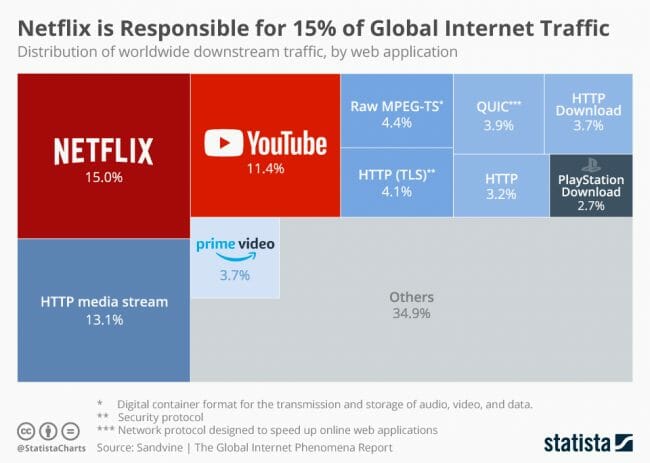By A Super Weird Coincidence, Largest Supporters of Net Neutrality Restrictions on ISPs Are The Largest Free Riders of ISP Bandwidth
Want to know who the largest financial supporters of "net neutrality" regulations are? Find them here: (source)
Think about the billions of dollars your ISP has spent to upgrade the bandwidth and speed of their network. 15% of that investment went to supporting Netflix's business, often without any compensation. Net neutrality supporters always pitch their fears as concern that little guys might get shut out or have to pay to play. But Comcast et. al. don't give a flip about the little guys. They are concerned about the amount of their network infrastructure used by, sometimes choked by, Netflix, Google/Youtube and Amazon. I have run projects to put internet access into large communities (in this case campgrounds with long-term campers). There is just an astronomical difference between the cost of a system that serves the majority of internet traffic but no video streaming and one that allows video streaming.
Let's use an analogy. Let's say that the highways in our state are getting torn up and we want to charge users for their use so we can repair and upgrade the roads. We propose to charge much more per semi-trailer than per car because semi-trailers with their up to 80,000 pound weight really tear up highways more than does your Prius. But the trucking companies object! They want road neutrality, and propose that the roads should not treat any traffic differently and all vehicles should be charged the same amount regardless of size. In fact, they go further -- all entities should be charged the same amount so that UPS with its 1000's of trucks on the road should pay the same flat fee (or no fee) as you pay with your one Prius. Fair?
This sort of supply chain / value chain negotiation goes on in every industry. It is also not unusual for participants in this negotiation to run to the government to try to get rules that tilt the playing field in their direction. This is the context in which I see the net neutrality discussion, an attempt by large content providers to hamstring bandwidth providers in this negotiation.
